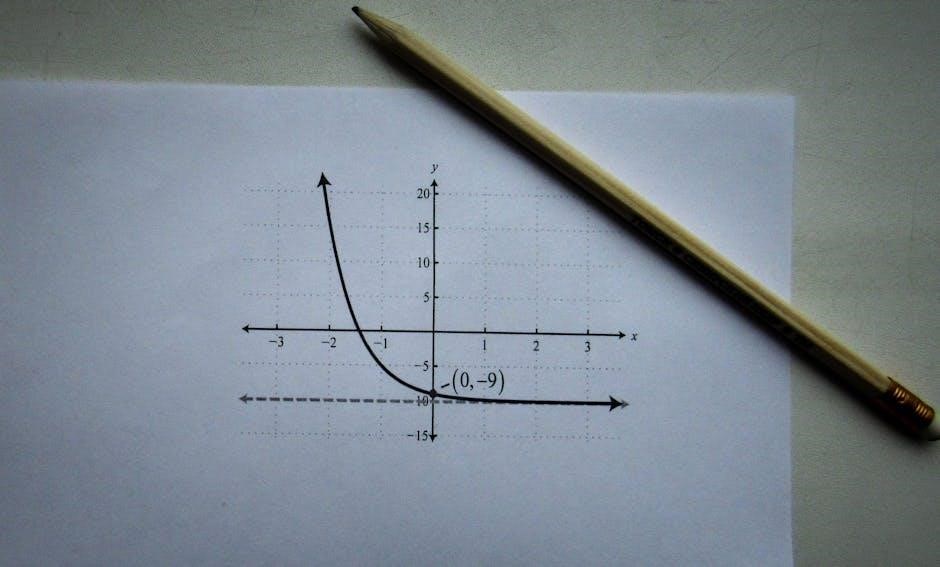The 2018 Chevrolet Equinox is a compact SUV blending practicality and style‚ offering a reliable and versatile driving experience․ This guide provides essential information for owners to understand and maintain their vehicle effectively․
1․1 Importance of the Owner’s Manual
The owner’s manual is a crucial resource for understanding the 2018 Chevrolet Equinox․ It provides detailed information about safety features‚ maintenance schedules‚ and troubleshooting tips․ By reading the manual‚ owners can maximize their vehicle’s performance‚ ensure proper care‚ and avoid potential issues․ It also offers guidance on advanced technologies and custom settings‚ helping drivers personalize their experience․ Keeping the manual in the vehicle ensures quick access to essential information‚ making it an indispensable tool for responsible ownership․ Regularly reviewing the manual helps owners stay informed and confident behind the wheel․
1․2 How to Use the Manual Effectively
To use the 2018 Chevrolet Equinox manual effectively‚ start by reviewing the table of contents to locate specific topics quickly․ Use the search function in digital versions to find keywords or sections․ Pay attention to warning symbols and notes‚ as they highlight critical information․ For complex features‚ refer to step-by-step guides and diagrams․ Organize the manual with bookmarks or tabs for easy navigation․ Regular updates and additional resources‚ like online guides‚ ensure you stay informed about your vehicle’s maintenance and operation․

Safety Features
The 2018 Chevrolet Equinox includes a comprehensive suite of safety features‚ such as airbags‚ electronic stability control‚ and advanced driver-assistance technologies‚ ensuring optimal protection and confidence on the road․
2․1 Standard Safety Features
The 2018 Chevrolet Equinox comes equipped with a range of standard safety features designed to protect occupants and prevent accidents․ These include multiple airbags‚ electronic stability control‚ and an anti-lock braking system (ABS)․ Additionally‚ a rear vision camera is standard‚ providing enhanced visibility when reversing․ The vehicle also features a tire pressure monitoring system‚ ensuring optimal tire performance and safety on the road․ These features work together to create a secure driving environment‚ giving owners peace of mind behind the wheel․
- MultIPLE AIRBAGS FOR OCCUPANT PROTECTION
- ELECTRONIC STABILITY CONTROL FOR IMPROVED TRACTION
- ANTI-LOCK BRAKING SYSTEM (ABS)
- REAR VISION CAMERA
- TIRE PRESSURE MONITORING SYSTEM
2․2 Advanced Safety Technologies
The 2018 Chevrolet Equinox offers advanced safety technologies to enhance driver confidence․ Features like Forward Collision Alert and Lane Departure Warning use sensors and cameras to monitor the road․ Adaptive Cruise Control adjusts speed to maintain a safe distance‚ while Rear Cross Traffic Alert improves safety during reversing․ These technologies‚ combined with automatic emergency braking‚ provide comprehensive protection and assist drivers in avoiding potential hazards․ They exemplify Chevrolet’s commitment to innovation and safety‚ ensuring a secure and modern driving experience for all occupants․
- FORWARD COLLISION ALERT
- LANE DEPARTURE WARNING
- ADAPTIVE CRUISE CONTROL
- REAR CROSS TRAFFIC ALERT
- AUTOMATIC EMERGENCY BRAKING
Vehicle Overview
The 2018 Chevrolet Equinox is a compact SUV offering a blend of practicality and style․ It features a spacious interior‚ versatile cargo options‚ and modern design elements․
3․1 Exterior Features
The 2018 Chevrolet Equinox boasts a sleek and aerodynamic exterior design with a bold front grille‚ LED headlights‚ and alloy wheels․ It also features a hands-free power liftgate for convenience‚ providing easy access to the cargo area․ The compact SUV offers a range of vibrant color options‚ enhancing its modern appeal․ Additionally‚ optional roof rails and crossbars are available for added versatility‚ catering to diverse lifestyles and needs․
3․2 Interior Features and Comfort

The 2018 Chevrolet Equinox offers a spacious and upscale interior designed for comfort and convenience․ Premium materials and ergonomic seating provide a refined driving experience․ The cabin features a dual-zone automatic climate control system‚ heated front seats‚ and a heated steering wheel for added comfort․ The infotainment system includes an 8-inch touchscreen with Apple CarPlay and Android Auto compatibility․ Ample cargo space‚ with 29․9 cubic feet behind the rear seats and up to 63․5 cubic feet with seats folded‚ makes it ideal for both daily commutes and adventures․ A cargo management system adds versatility for organizing belongings․

Instruments and Controls
The dashboard features a clear instrument cluster‚ intuitive controls‚ and a central touchscreen for infotainment․ Buttons for climate‚ audio‚ and driver assists are logically arranged for easy access․
4․1 Dashboard Overview
The 2018 Chevrolet Equinox dashboard is designed for driver convenience and clarity․ It features a central infotainment touchscreen‚ climate control buttons‚ and an instrument cluster displaying speed‚ fuel level‚ and warnings․ The steering wheel houses audio and cruise controls‚ while the gearshift is centrally located for easy access․ The dashboard also includes USB ports and a 12V power outlet for charging devices․ This layout ensures all essential functions are within the driver’s reach‚ promoting a safe and enjoyable driving experience․
4․2 Infotainment System
The 2018 Chevrolet Equinox features an intuitive infotainment system with an 8-inch touchscreen display․ It supports Apple CarPlay and Android Auto for seamless smartphone integration․ The system includes Bluetooth connectivity‚ voice command functionality‚ and USB ports for media playback․ Drivers can access navigation‚ climate controls‚ and vehicle settings through the interface․ The infotainment system also offers customizable profiles and SiriusXM radio compatibility‚ enhancing the overall driving experience with convenience and entertainment options․
Driving Information
The 2018 Chevrolet Equinox offers a smooth driving experience with responsive steering and efficient transmission‚ ensuring comfort and control․ Advanced technology features enhance the drive․
5․1 Starting and Operating the Vehicle
To start the 2018 Chevrolet Equinox‚ insert the key fob into the vehicle‚ press the brake pedal‚ and press the push-button start․ Ensure all lights on the dashboard dim or turn off after starting․ Adjust settings like temperature‚ seating‚ and mirrors for comfort․ Always perform a quick check of mirrors‚ seatbelts‚ and surroundings before driving․ The vehicle features a smooth ignition system and responsive controls․ For added convenience‚ remote start is available on select models․ Refer to the manual for detailed steps on operating adaptive features and advanced driving modes․
5․2 Transmission and Driving Modes
The 2018 Chevrolet Equinox features a smooth 6-speed automatic transmission‚ ensuring seamless gear shifts and responsive acceleration․ It also offers selectable drive modes‚ including Normal‚ Sport‚ and Snow‚ to adapt to various driving conditions․ The Sport mode enhances throttle response for a more dynamic feel‚ while Snow mode optimizes traction for slippery surfaces․ For added control‚ the available all-wheel-drive system distributes power between front and rear wheels‚ improving stability and grip․ These features collectively enhance the driving experience‚ providing both comfort and confidence behind the wheel․
Maintenance and Care
Regular maintenance is crucial for the longevity and performance of your 2018 Chevrolet Equinox․ Follow the owner’s manual for scheduled services‚ fluid checks‚ and inspections to ensure optimal functionality and safety․
6․1 Scheduled Maintenance
Scheduled maintenance is essential to ensure the longevity and performance of your 2018 Chevrolet Equinox․ Follow the recommended service intervals outlined in the owner’s manual․ Regular oil changes‚ tire rotations‚ and inspections are critical․ The manual specifies intervals for services such as spark plug replacement and fluid checks․ Adhering to these schedules helps prevent wear and tear‚ maintains fuel efficiency‚ and ensures safety․ Neglecting scheduled maintenance can lead to premature component failure and increased repair costs․ Always refer to the manual for detailed guidelines and recommendations tailored to your vehicle’s needs․
Troubleshooting and Repairs
This section provides guidance for identifying and addressing common issues in your 2018 Chevrolet Equinox․ Refer to diagnostic alerts and warning lights for timely repairs and maintenance․
7․1 Diagnostic Alerts and Warning Lights
The 2018 Chevrolet Equinox features a range of diagnostic alerts and warning lights to monitor vehicle systems․ These indicators‚ displayed on the dashboard‚ signal maintenance needs‚ system malfunctions‚ or safety concerns․ Familiarize yourself with symbols like the check engine light‚ tire pressure monitor‚ or battery alert․ Each light corresponds to specific issues‚ ensuring timely attention․ Refer to the owner’s manual for detailed explanations and guidance on addressing these alerts․ If a light illuminates‚ consult the manual or contact a certified technician for assistance to maintain your vehicle’s optimal performance and safety․

Warranty and Support
The 2018 Chevrolet Equinox comes with a comprehensive warranty program designed to protect your investment․ It includes a 3-year/36‚000-mile bumper-to-bumper warranty and a 5-year/60‚000-mile powertrain warranty․ Additional support includes 5 years or 60‚000 miles of roadside assistance and courtesy transportation․ For detailed coverage and terms‚ refer to the owner’s manual or visit Chevrolet’s official website․ These programs ensure peace of mind and reliable service for your vehicle‚ providing coverage for parts‚ labor‚ and unexpected repairs during the warranty period․
Accessories and Customization
The 2018 Chevrolet Equinox offers a variety of accessories to enhance functionality and personalization․ From roof racks and cargo management systems to exterior styling elements‚ these additions allow owners to tailor their vehicle to their lifestyle․ Interior accessories like premium floor mats and cargo trays provide added convenience․ Additionally‚ Chevrolet provides customization options for exterior trim‚ wheels‚ and decals to give your Equinox a unique look․ These accessories are designed to complement the vehicle’s design while maintaining its performance and durability‚ ensuring a seamless integration with your driving experience․

Technical Specifications
The 2018 Chevrolet Equinox features a range of technical specifications that define its performance and capabilities․ With a choice of engines‚ including a 1․5L turbocharged option‚ the Equinox delivers efficient power․ Its compact design allows for agile handling‚ while the available all-wheel-drive system enhances traction․ The vehicle offers a maximum cargo capacity of up to 63․5 cubic feet‚ making it versatile for various needs․ The Equinox also comes with a 6-speed automatic transmission‚ ensuring smooth acceleration․ These specifications highlight the model’s balance of functionality‚ efficiency‚ and reliability‚ catering to diverse driving preferences and requirements‚ ensuring a robust and adaptable vehicle for everyday use․






















































